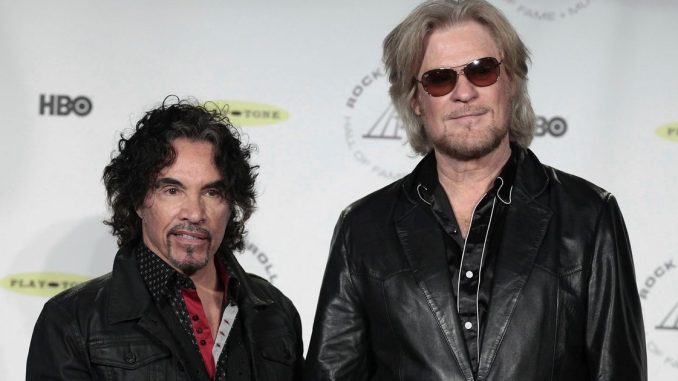
NASHVILLE, Tenn. (AP) — Daryl Hall has sued his longtime music partner John Oates, arguing that his plan to sell off his share of a joint venture would violate the terms of a business agreement the Hall & Oates duo had forged.
The move quickly prompted a judge to temporarily block the sale while legal proceedings and a previously initiated arbitration continue.
A Nashville chancery court judge issued the temporary restraining order on Nov. 16, writing that Oates and others involved in his trust can’t move to close the sale of their share of Whole Oats Enterprises LLP to Primary Wave IP Investment Management LLC until an arbitrator in a separately filed case weighs in on the deal, or until the judge’s order expires — typically within 15 days, unless a judge extends the deadline.
Chancellor Russell Perkins issued the order the same day Hall filed his lawsuit, which was largely brought forth under seal, obscuring most details. An order Wednesday by the judge allowed more filings to be made public, though many details about the pair’s business agreement and the proposed sale remain under wraps.
Writing in favor of sealing certain filings, Hall’s attorneys reasoned that it’s a private dispute under an agreement with confidential terms, concerning a confidential arbitration process.
Although the publicly released version of the lawsuit didn’t specify what’s at stake in the sale, Primary Wave has already owned “significant interest” in Hall and Oates’ song catalog for more than 15 years. In a 2021 interview with Sky News, Hall alluded to disappointment with the sale of his back catalog.
“Oh, in the early days, it got sold off for me and I didn’t get the money,” he said. In the same interview, he advised artists to retain their publishing rights, saying “all you have is that.”
The lawsuit contends that Hall opened an arbitration process on Nov. 9 against Oates and the other defendants in the lawsuit, Oates’ wife, Aimee Oates, and Richard Flynn, in their roles as co-trustees of Oates’ trust. Hall was seeking an order preventing them from selling their part in Whole Oats Enterprises to Primary Wave Music.
According to the lawsuit, Oates’ team intimated at the time that the sale could close within days, although no arbitrator had been picked yet to sort through the conflict.
The lawsuit says Oates’ team entered into a letter of intent with Primary Wave Music for the sale, and alleges further that the letter makes clear that the music duo’s business agreement was disclosed to Primary Wave Music in violation of a confidentiality provision.
“Thus, the entire Unauthorized Transaction is the product of an indisputable breach of contract,” the lawsuit states.
The case will be taken up at a Nov. 30 court hearing.
The Associated Press sent emails to attorneys for both parties and to representatives for Primary Wave Music on Friday. Still unclear is whether the dispute centers on the music catalog of Hall & Oates, a soft-rock-and-pop duo best known for its No. 1 hits “Private Eyes,” “Rich Girl” and “Maneater.”
Daryl Hall and John Oates got their start as Temple University students before signing with Atlantic Records in 1972. In the decades since, they have achieved six platinum albums and many more Top 10 singles with their unique approach to blue-eyed soul. Hall & Oates was inducted into the Rock & Roll Hall of Fame in 2014 and its latest album, “Home for Christmas,” was released in 2006. The duo continued to perform as of last year.
“We have this incredibly good problem of having so many hits,” Oates told the AP in 2021, just before resuming a national tour that had been delayed because of the coronavirus pandemic. “Believe me, it’s not a chore to play those songs because they are really great.”
Sherman reported from Copperas Cove, Texas.


Be the first to comment